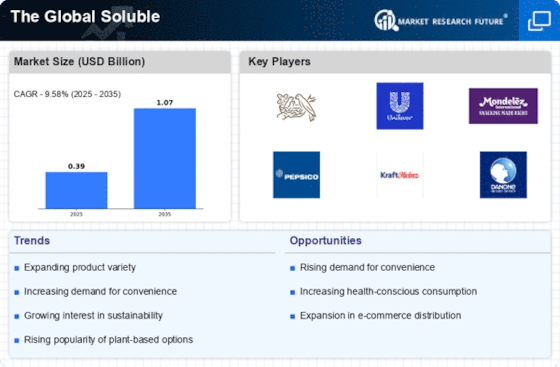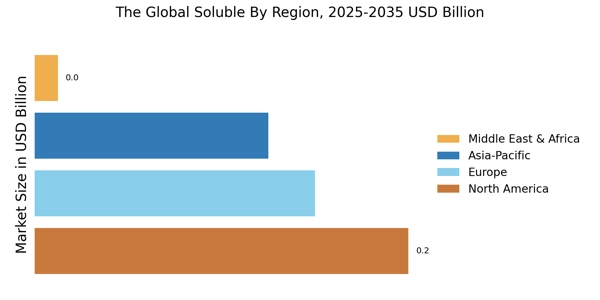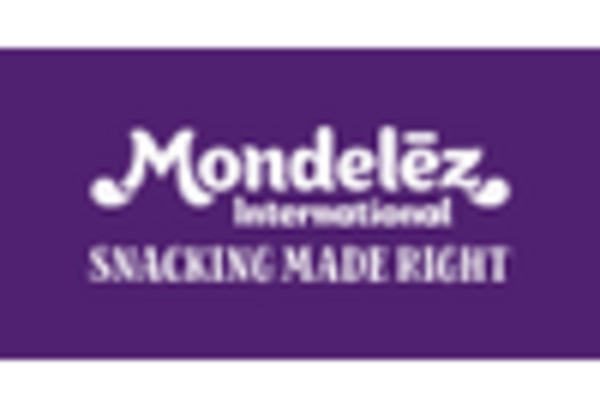Rising Health Consciousness
Rising health consciousness among consumers is a pivotal driver of The Global Soluble Industry. As individuals become more aware of the importance of nutrition and wellness, there is a marked increase in the consumption of soluble products that offer health benefits. This trend is reflected in the growing popularity of soluble fibers and plant-based proteins, which are often marketed for their digestive health and nutritional advantages. Market data indicates that the soluble fiber segment is projected to grow at a CAGR of 7% through 2026. This heightened focus on health is prompting manufacturers to innovate and diversify their product lines, catering to the evolving preferences of health-conscious consumers. Consequently, the market is witnessing a surge in demand for functional soluble products that align with these health trends.
Increasing Consumer Awareness
Increasing consumer awareness regarding product ingredients and health benefits is driving The Global Soluble Industry. Consumers are becoming more discerning, seeking products that align with their health and wellness goals. This trend is evident in the rising demand for soluble dietary supplements and functional foods, which are perceived as beneficial for overall health. Market data indicates that the soluble dietary supplement segment is expected to grow at a CAGR of 8% over the next five years. As consumers prioritize transparency and quality, manufacturers are compelled to invest in research and development to create innovative soluble products that cater to these preferences. This shift in consumer behavior is likely to influence product formulations and marketing strategies, further propelling market growth.
Expansion of E-commerce Platforms
The expansion of e-commerce platforms is significantly impacting The Global Soluble Industry. With the rise of online shopping, consumers have greater access to a diverse range of soluble products. This trend is particularly pronounced in regions where traditional retail channels may be limited. E-commerce allows for targeted marketing and personalized shopping experiences, which can enhance consumer engagement. Market analysis suggests that online sales of soluble products are expected to account for over 25% of total sales by 2027. Additionally, the convenience of home delivery and the ability to compare products easily are driving more consumers to purchase soluble items online. As a result, companies are increasingly focusing on their online presence and digital marketing strategies to capture this growing segment of the market.
Technological Advancements in Production
Technological advancements in production processes are reshaping The Global Soluble Industry. Innovations such as improved extraction methods and enhanced solubility techniques are leading to higher quality products. For instance, the introduction of advanced spray-drying technology has increased the efficiency of producing soluble products, thereby reducing costs. This has resulted in a more competitive market landscape, where companies can offer better pricing and quality. Furthermore, automation in manufacturing processes is streamlining operations, allowing for greater scalability. As a result, businesses are better positioned to meet the growing consumer demand for soluble products, which is projected to reach a market value of approximately USD 30 billion by 2026. These advancements not only enhance product offerings but also contribute to overall market growth.
Sustainability and Eco-friendly Practices
Sustainability and eco-friendly practices are increasingly influencing The Global Soluble Industry. As environmental concerns gain prominence, consumers are gravitating towards products that are produced sustainably. This shift is prompting manufacturers to adopt eco-friendly sourcing and production methods, which not only appeal to environmentally conscious consumers but also enhance brand loyalty. Market Research Future indicates that products with sustainable certifications are experiencing higher sales growth compared to conventional options. Furthermore, companies are exploring biodegradable packaging solutions for their soluble products, aligning with consumer preferences for reducing plastic waste. This commitment to sustainability is likely to shape the future of the market, as businesses that prioritize eco-friendly practices may gain a competitive edge in an increasingly conscientious consumer landscape.

















